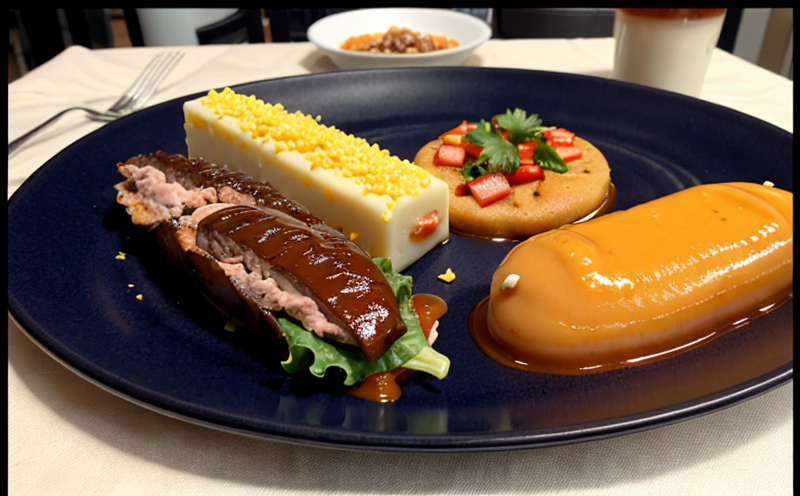EN 13130-1 Migration from Plastics into Food
The European standard EN 13130-1 is a critical benchmark for ensuring the safety of food contact materials, particularly plastics. This standard addresses the potential migration of additives and other components used in packaging into foods during processing or consumption. Compliance with this test is mandatory for many plastic products that come into direct contact with foodstuffs.
The primary objective of EN 13130-1 is to assess whether there is a transfer of chemical substances from the material to the food under specified conditions. These conditions include temperature, time, and type of food simulant used during the testing process. This assessment helps prevent the introduction of harmful substances into the food supply chain.
The test procedure involves subjecting the packaging material or product to specific immersion tests using various types of food simulants like water, oil, acidic solutions, and alcoholic beverages. The duration of these immersions can vary depending on the type of plastic involved. After exposure, the samples are analyzed for any detectable migration of chemicals into the food simulant.
The analysis typically focuses on a wide range of compounds including monomers, oligomers, antioxidants, stabilizers, and other additives used in the production of plastics. The testing process is designed to identify even trace amounts of these substances that might be transferred from the packaging material into the food.
Understanding the potential risks associated with migration from plastic packaging into food is crucial for maintaining public health and ensuring regulatory compliance. This standard plays a vital role in safeguarding consumers by providing assurance that only safe materials are used in the production of food-contact items.
The testing methodology outlined in EN 13130-1 is comprehensive and rigorous, covering various aspects such as sample preparation, immersion conditions, extraction methods, and analytical techniques. It ensures a standardized approach to evaluating migration risks across different types of plastics used in the food industry.
Given its importance, this test is widely recognized by regulatory bodies and industry stakeholders worldwide. Compliance with EN 13130-1 not only meets legal requirements but also enhances brand reputation by demonstrating commitment to product safety and quality assurance.
In summary, the EN 13130-1 standard provides a robust framework for assessing migration from plastics into food, ensuring that packaging materials do not pose any risks to public health. By adhering to these stringent testing protocols, manufacturers can confidently produce safe and compliant products.
Industry Applications
- Packaging manufacturers looking to ensure their plastic packaging meets regulatory requirements for food contact materials.
- R&D departments seeking data on potential migration of additives from plastics into different types of foods.
- Quality assurance teams responsible for verifying compliance with international standards like EN 13130-1.
- Procurement officers interested in sourcing compliant packaging materials that are safe for use with food products.
Eurolab Advantages
At Eurolab, we specialize in providing comprehensive testing solutions tailored to the unique needs of our clients. Our team of experts ensures that every test conducted adheres strictly to international standards such as EN 13130-1.
We offer a range of services including sample preparation, immersion simulation using various food simulants, and advanced analytical techniques for detecting even trace levels of migrated substances. Our state-of-the-art facilities equipped with high precision instruments guarantee accurate results every time.
Our experienced technicians possess deep knowledge in polymer science and food safety regulations, enabling them to provide insightful recommendations based on test outcomes. This approach helps our clients make informed decisions about their product formulations and manufacturing processes.
We pride ourselves on delivering reliable, fast turnaround times without compromising on quality. With a reputation built on trust and excellence, Eurolab stands as your partner in ensuring the highest standards of safety and compliance for all your packaging testing needs.
Environmental and Sustainability Contributions
In addition to safeguarding public health, adhering to EN 13130-1 also promotes environmental sustainability by encouraging the use of safer materials in food packaging. By reducing the risk of harmful substances leaching into food, this standard supports a more sustainable approach to plastic production and disposal.
The testing process identifies potential hazards early on, allowing manufacturers to modify their formulations if necessary. This proactive stance not only protects consumer health but also minimizes unnecessary waste by preventing non-compliant products from reaching the market.
Moreover, compliance with EN 13130-1 fosters innovation within the packaging industry by driving research into safer and more sustainable alternatives to traditional plastics. As environmental concerns continue to grow, adopting such standards becomes increasingly important for businesses aiming to reduce their ecological footprint while maintaining high levels of product safety.
By integrating EN 13130-1 into their operations, companies contribute positively towards creating a safer and more sustainable future. Through rigorous testing and continuous improvement efforts, they demonstrate their dedication to both human health and environmental preservation.





